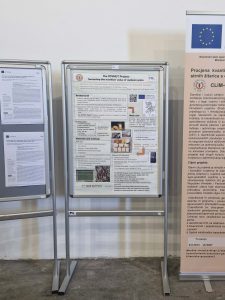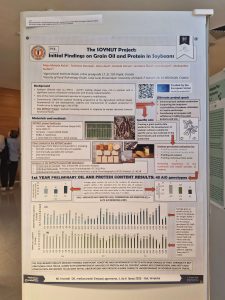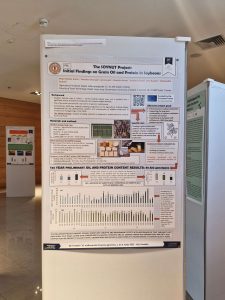- Soybean germplasm evaluation: Nutritive grain quality under climate change conditions
- Genotypic selection of peas under climate change
- Innovative strategies for early stress detection and increasing maize tolerance to cold stress
- Legumes as a source of biologically active phytochemicals
- Breeding development of alfalfa and red clover germplasm adapted to climate changes
- Predictive modelling of agronomic traits in maize using modern technologies
- Assessment of quantitative traits in small grain cereals germplasm considering climate change
- The role of genetic specificity, plant growth regulators, and biostimulants in increasing the resistance to abiotic and biotic stress, yield, and quality of sour cherry fruit
- The influence of climate changes on the expression of the most important agronomic, physiological and biochemical traits of sunflower under conditions of different plant density
- Influence of combined abiotic stresses and climatic oscillations on production and quality of seed
- Water, soil and cultivar – fundamental elements of sustainable agriculture in climate change
Full project title
Soybean germplasm evaluation: Nutritive grain quality under climate change conditions
Project acronym
SOYNUT
Lead researcher
Maja Matoša Kočar, PhD, Scientific Associate
Project team members
- Aleksandra Sudarić, PhD, Senior Scientific Advisor, Agricultural Institute Osijek
- Tomislav Duvnjak, PhD, Senior Scientific Advisor, Agricultural Institute Osijek
- Ivica Liović, PhD, Senior Scientific Advisor, Agricultural Institute Osijek
- Daniela Horvat, PhD, Scientific Advisor, Agricultural Institute Osijek
- Gordana Šimić, Senior Scientific Associate, Agricultural Institute Osijek
- Ines Banjari, PhD, Full Proffesor, Faculty of Food Technology Osijek
- Ivan Drenjančević, BSc, Technologist, Agricultural Institute Osijek
Project financing source
National Recovery and Resilience Plan 2021-2026 within the framework of the Program Agreement with the Ministry of Science, Education and Youth
Project budget
36.530,00 EUR
Project summary
The SOYNUT project proposal was created in response to market demands for increasing the nutritive value of food. The main project goal is soybean germplasm’s nutritive grain quality evaluation in changing weather conditions. The research methodology includes conventional soybean cultivation during a three-year field experiment and modern analytical methods of phenotyping grain nutritive quality (grain protein content, individual amino acids, grain oil content and individual fatty acids) for a maximum of 55 soybean genotypes. The SOYNUT project members are scientists from the Agricultural Institute Osijek and the Faculty of Food Technology Osijek, making an interdisciplinary research team.
The main project result will be the construction of a platform for improving the nutritive value of food under climate change. The platform will consist of two parts: 1) the development of soybean cultivars particularly suitable for specific use as raw materials in the food industry and animal feed production, and 2) increasing the general population’s awareness of the nutritive value of soybeans as a food and raw material. Planned project activities will result in a database of researched grain properties. The stability of investigated grain properties will be assessed and the available soybean germplasm will be evaluated to select parental components for breeding nutritively superior cultivars. By promoting the health benefits of soy consumption, a contribution will be made to increasing the general population’s awareness of its nutritive value. Furthermore, the project will intensify interdisciplinary scientific research and professional work with the existing infrastructure capacities of the Agricultural Institute Osijek and ensure the development and strengthening of its scientific staff.
Project aims
The main SOYNUT project goal is soybean germplasm’s nutritive grain quality evaluation in changing weather conditions. The goal will be achieved by:
- determining the genetic variability of grain protein content for a maximum of 55 soybean genotypes,
- determining the genetic variability of individual amino acids in the grain for a maximum of 55 soybean genotypes,
- determining the genetic variability of grain oil content for a maximum of 55 soybean genotypes,
- determining the genetic variability of individual fatty acids in the grain for a maximum of 55 soybean genotypes,
- determining the stability of the investigated grain properties in changing environmental conditions.
Additional objectives include:
- increasing the general population’s awareness of the nutritive value and health benefits of soybean consumption,
- improvement of the analysis of plant material and rationalisation of research equipment, i.e. improvement of scientific knowledge in the field of environmentally acceptable production of quality and safe food with the existing infrastructure capacity of the Agricultural Institute Osijek,
- the establishment of an interdisciplinary research group through the cooperation of scientists from different departments of the Agricultural Institute Osijek and the Faculty of Food Technology Osijek,
- development and strengthening of human resources for scientific work.
Project News
Lead project researcher Maja Matoša Kočar and project team member Ines Banjari presented the project ˝Soybean germplasm evaluation: Nutritive grain quality under climate change conditions (SOYNUT)˝ at the Fifth International Congress ˝Food Technology, Quality and Safety – FoodTech˝ held in Novi Sad (Republic of Serbia) from 16 to 18 October 2024. The project was represented with an abstract and poster entiteled ˝The SOYNUT Project: Increasing the nutrition value of soybean grain˝ by Maja Matoša Kočar, Aleksandra Sudarić, Tomislav Duvnjak, Daniela Horvat, Gordana Šimić, i Ines Banjari. The congress information can be found HERE.
As foreseen in the work plan of the project ˝Soybean germplasm evaluation: Nutritive grain quality under climate change conditions (SOYNUT)˝, in 2024 a questionnaire was created in the publicly available service Google Forms. The questionnaire is completely anonymous and includes general questions about consumer knowledge of soybeans and soybean products (fear of genetically modified soybeans, health benefits of soybeans, etc.) and the frequency of consumption of soybeans and soybean products available on the market of the Republic of Croatia. The target population is between 18 and 75 years of age. The questionnaire can be found HERE.
The project ˝Soybean germplasm evaluation: Nutritive grain quality under climate change conditions (SOYNUT)˝ was presented with a poster at the Wheat and Barley Field Day 2025 manifestation of the Agricultural Institute Osijek, which contributed to the project’s visibility.
Lead project researcher Maja Matoša Kočar participated in the 60th Croatian and 20th International Symposium on Agriculture held in Bol (Republic of Croatia) from 1 to 6 June. The aim of the participation was the dissemination of the preliminary results of the project ˝Soybean germplasm evaluation: Nutritive grain quality under climate change conditions (SOYNUT)˝. Part of the first year’s project results was published in Symposium Proceedings as an original scientific paper entitled ˝The SOYNUT Project: Initial Findings on Grain Oil and Protein in Soybeans˝ by Maja Matoša Kočar, Tomislav Duvnjak, Ivica Liović, Daniela Horvat, Gordana Šimić, Ines Banjari, Aleksandra Sudarić. The paper was presented at the Symposium in poster form. The symposium information can be found HERE.




